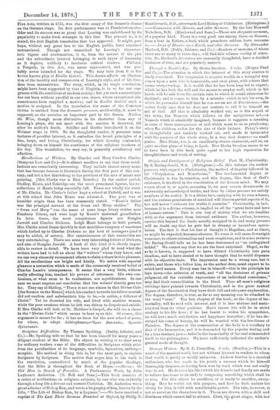Origin and Development of Religious Belief Part II., Christianity. By
S. Baring-Gould, M.A. (Rivingtons.)—Iu this volume the author pursues, with regard to Christianity, the method of inquiry followed in his "Polytheism and Monotheism." Tho fundamental dogma of Christianity is the Incarnation, and this dogma, like that of God's existence, is involved in the constitution of the human mind. We may reason about it, or again, assuming it, we may reason downwards to universally acknowledged truths, and thus by either process we satisfy numbers of its reality. It is a divine fact, carrying with its own witness, and the various generations of mankind will discern partial aspects of it, but will never " exhaust the truths it contains." Christianity, in fact, because it is a divine scheme, is implied in all the "great facts and laws of human nature." This is one way of stating what we are familiar with as the argument from internal evidence. The author, however, carries this beyond the limits usually assigned to it, and many persons will no doubt say that he gets lost in dreamy or hazardous specu- lation. The fact is that his lino of thought is Hegelian, and at times, as might be expected, becomes obscure. To some it will seem downright nonsense, to others rationalism and even scepticism, and in some reviews Mr. Baring-Gould tells us he has been denounced as "an undisguised infidel." We cannot say that we are the least surprised. Hegel, so far as he is known, is supposed to have diluted Christianity into pure idealism, and to have denied or to have thought that he could dispense with its objective facts. The impression may be a wrong one, but it exists, and those who follow him, as the author does, must expect to be called hard names. Every man has in himself—this is the principle he lays down—the criterion of truth, and "all the decisions of private judgment, all the veritable expressions of an individual conscience," may find their reconciliation in the Ideal. Thus all men's religious strivings have pointed towards Christianity, and in the great central dogma of the Incarnation they have their full and adequate explanation. The dogma, therefore, is true, so far as any meaning can be attached to the word "true." The last chapter of the book, on tho dogma of im- mortality, will be read with interest, and it is less abrtuse and meta- physical than its other portions. Man's future life will be in strict analogy to his life here ; if he has learnt to widen his sympathies, he will have much satisfaction and happiness hereafter ; if he has de- stroyed his sense of beauty, ho will be wearied with the loveliness of Paradise. The dogma of the resurrection of the body is a corollary to that of the Incarnation, and it is demanded by the popular feeling and by a true instinct, just as belief in the immortality of the soul commended' itself to the philosophers. We have sufficiently indicated the author's general mode of thought.






































 Previous page
Previous page